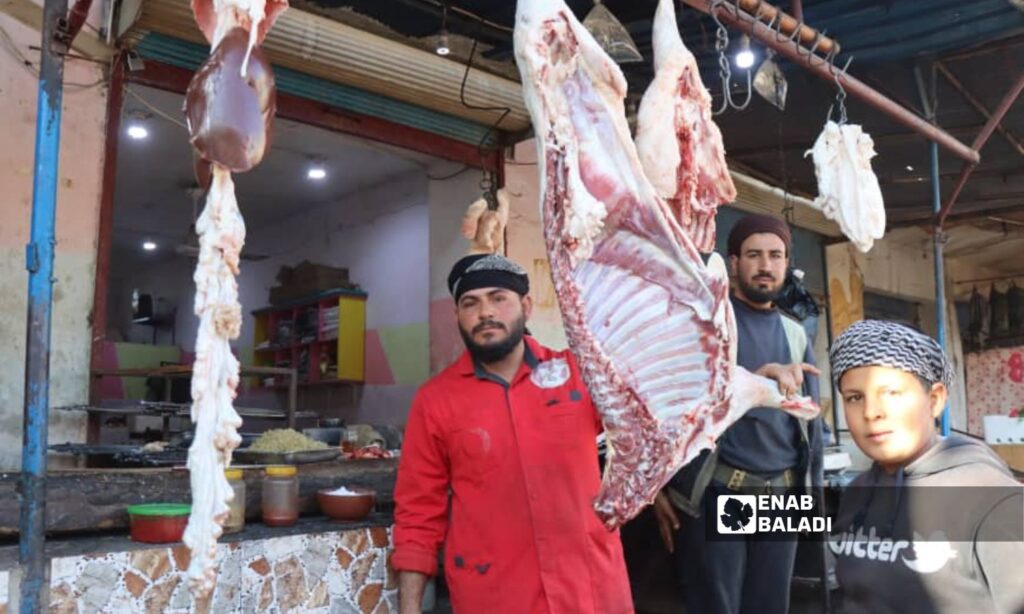Prices of red meats in most areas of the countryside of Deir Ezzor, under the control of the Syrian Democratic Forces (SDF), have seen a noticeable increase. This has led to some butchers abandoning the profession.
Hamza, a meat shop owner in the village of Darnaj, east of Deir Ezzor, told Enab Baladi that he began his career in butchery about 25 years ago, where he sold meat in carcasses (the whole sheep after slaughter).
Following the events that occurred in the region and the deterioration of the economic situation, the situation in Deir Ezzor changed and people began to buy meat by the gram, Hamza added.
The shop owner believes that the constant rise in meat prices is due to the deterioration of the Syrian pound and the economic conditions, leading to a significant decline in sales. Additionally, the accumulation of debt on customers is hindering butchers from buying new goods.
Abandoning the profession
Economic conditions and the high prices of meat have forced Hamza to close his shop and look for an alternative profession. He pointed out that meat has become a product not available to many residents of the area. Because of the high prices and the decline in purchasing power, their priorities focus particularly on bread and fuel, amid the severe cold waves sweeping through the region.
He added that the rise in livestock prices also contributed to the increase in meat prices, causing disruption to the buying and selling movements in his shop and a negative impact on his business due to the weak customer turnout.
Dawood, a teacher in a school in the village of Hawayij al-Bumsaa, west of Deir Ezzor, told Enab Baladi that he has not been able to bring meat into his house for more than two months due to the deterioration of the Syrian currency and his salary, which barely covers a week’s expenses.
Dawood’s monthly income is one million Syrian pounds (approximately 67 US dollars).
Price inflation
Enab Baladi conducted a tour in various markets in the countryside of Deir Ezzor to find out meat prices. According to its findings, the price of one kilo of red meat reached 160,000 Syrian pounds.
The price varies from one shop to another, with some shop owners selling a kilo at 150,000 pounds and others at prices up to 110,000 pounds.
Ten days before, the meat prices ranged between 110,000 pounds for boned mutton and 95,000 pounds for meat with bones.
An economic director in the Central Canton (the Autonomous Administration divides Deir Ezzor into four cantons) told Enab Baladi that the market is affected by environmental and climatic conditions, including seasonal conditions such as drought, in addition to the demand for the product and how it is presented in the markets.
The director, who refrained from mentioning his name as he is not authorized to speak to the media, added that the issue of controlling meat prices is difficult due to multiple factors. These include price rises associated with rainfall, decreasing feed prices, and the absence of slaughterhouses belonging to the Autonomous Administration, which is the responsibility of the services authority and municipality.
As for exports, it involves administrative decisions, regulation of crossings, and security matters controlled by the military forces concerned with customs and others, according to the economic director.
Regarding other supply materials, a free-market law applies in the northeastern regions of Syria, where supply and demand determine the prices of various goods and products, taking into account a profit margin ranging between 15% and 25%.
Some subsidized commodities such as sugar and bread are exempt from these market laws, with their prices and monitoring being precisely determined by the Autonomous Administration according to the laws in effect, and regulated by monitors associated with the region’s economic committee.
Livestock auctions in the eastern countryside of Deir Ezzor – January 31, 2024 (Enab Baladi/Obadah al-Sheikh)
Livestock auctions
Livestock auctions in the countryside of Ezzor recorded high sales prices for cows, sheep, and calves, with cow prices ranging between 10 and 45 million pounds per cow, and a calf ranging between 10 and 25 million depending on weight.
The price of a sheep starts from one million up to five, and an ewe starts from one million and can reach up to three million.
During the tour conducted by Enab Baladi in the livestock market, some merchants confirmed that prices would rise with the approach of Ramadan.

